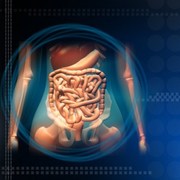Pediatric short bowel syndrome is a disorder characterized by diarrhea, malabsorption, and fluid and electrolyte disturbances. In newborns the cause is a congenital anomal. In premature newborns, necrotizing entercolitis, which is an infectious inflammatory disease, is associated with short bowel syndrome (SBS). In older infants and children, SBS is the result of disease or traumatic injury.
The most common causes are:
Necrotizing entercolitis - an infectious inflammatory disease of premature newborns;
Intestinal volvulus - the bowel gets twisted and the blood supply is impaired
Conditions which are present at birth are intestinal malrotation and gastroschisis. Intestinal malrotation is the twisting of the intestines caused by abnormal development while the fetus is in utero. (1) Gastroschisis causes the fetal bowel to stick out of the body through a defect in the abdominal wall, usually to the right of the umbilicus (belly button). (2) Factors causing SBS in older infants and children are surgical removal of the small bowel due to disease of the ileum or traumatic injury and Crohn's disease.
The major concern is malabsorption, a condition resulting from the intestines' inability to absorb enough nutrients from food. The extent of a SBS child's problems is usually dependent on which sections of the small bowel are affected. The normal small bowel varies in length between 10 and 28 feet and is divided into three sections:
Duodenum, which immediately follows the stomach;
Jejunum, which comprises 2/5 of the small intestines; and
Ileum, which is the remaining 3/5 of the small bowel.
While removal of 1/2 of the small intestine and the jejunum can be tolerated, removal of the ileum accounts for most of the problems associated with short bowel syndrome.
Many patients with SBS must receive enteral (nutrients are delivered directly into the stomach or small intestines through a tube) or parenteral (intravenous) nutrition. Nutritional management is the primary treatment for SBS. The aim is to help the remaining intestines adapt and assume the absorption functions that have been comprised. Medications such as Imodium are used to control diarrhea. Ursodeoxycholic acid, which is a naturally occurring bile, is used to dissolve and prevent cholesterol gallstone formation and to treat biliary cirrhosis (the bile ducts in the liver are slowly destroyed). Acid blocking agents and vitamin supplements can be used.
STEP, serial transverse interpolate procedure, was first performed in 2002 by pediatric surgeons at Children's Hospital Boston. This is a surgical procedure which is recommended for children who are dependent on intravenous nutrition. The goal is to increase the length of the small intestine so that nutrition received through the gastrointestinal tract can be better tolerated and the child can be eventually weaned off of intravenous nutrition. (3)
(1) www.kidshealth.org
(2) www.chop.edu
(3) www.childrenshospital.org






Add a CommentComments
There are no comments yet. Be the first one and get the conversation started!